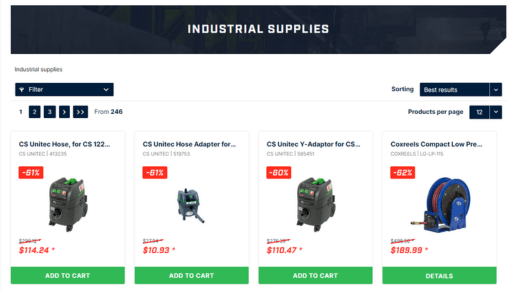Industrial supplies are the backbone of efficient operations across various sectors, from manufacturing to construction. In this article, we provide an in-depth analysis of the key aspects of Industrial supplies, aiming to equip businesses with the knowledge necessary to make informed decisions and optimize their operational efficiency.
Understanding Industrial Supplies
Industrial supplies encompass a broad range of products and materials used in industrial operations. These supplies include tools, machinery, safety equipment, maintenance products, and raw materials. Understanding the categories and applications of these supplies is crucial for ensuring smooth and efficient operations.
Categories of Industrial Supplies
1. Tools and Equipment
Industrial tools and equipment are essential for the day-to-day operations of any industrial facility. This category includes hand tools, power tools, and heavy machinery. Each tool serves a specific purpose, from cutting and welding to drilling and assembling.
2. Safety Equipment
Safety is paramount in industrial environments. Safety equipment includes personal protective equipment (PPE) such as helmets, gloves, goggles, and ear protection. Additionally, it encompasses safety signs, emergency showers, and first aid kits, all designed to prevent accidents and ensure a safe working environment.
3. Maintenance Supplies
Maintenance supplies are critical for the upkeep of industrial facilities. These include lubricants, cleaning agents, adhesives, and sealants. Regular maintenance ensures that machinery operates efficiently and reduces the risk of breakdowns, thereby extending the lifespan of equipment.
4. Raw Materials
Raw materials are the foundational elements used in manufacturing processes. These can range from metals and plastics to chemicals and textiles. The quality and availability of raw materials significantly impact the production process and final product quality.
Importance of Quality in Industrial Supplies
Ensuring the quality of industrial supplies is vital for maintaining operational efficiency. High-quality supplies lead to better performance, reduced downtime, and increased safety. Investing in reputable brands and suppliers can result in long-term cost savings and improved productivity.
Selecting the Right Industrial Supplier
Choosing the right supplier for industrial supplies is a critical decision that affects the overall efficiency of operations. Key factors to consider include:
- Reputation and Reliability: Look for suppliers with a proven track record of reliability and customer satisfaction.
- Product Range: Ensure the supplier offers a comprehensive range of products to meet all your industrial needs.
- Quality Assurance: Verify that the supplier adheres to strict quality control standards.
- Customer Support: Opt for suppliers that provide excellent customer service and support.
Trends in Industrial Supplies
The industrial supply sector is continually evolving, driven by technological advancements and changing industry needs. Some current trends include:
1. Automation and Smart Tools
The integration of automation and smart technology in industrial tools is transforming operations. Smart tools equipped with sensors and connectivity features enhance precision, efficiency, and data collection, enabling predictive maintenance and real-time monitoring.
2. Sustainability
Sustainability is becoming increasingly important in industrial operations. Eco-friendly products, energy-efficient machinery, and sustainable sourcing practices are gaining traction. Businesses are focusing on reducing their environmental footprint while maintaining high operational standards.
3. Digital Supply Chains
The digitalization of supply chains is revolutionizing the procurement and management of industrial supplies. Digital platforms enable real-time tracking, streamlined procurement processes, and improved inventory management, leading to cost savings and increased efficiency.
Conclusion
Industrial supplies are a critical component of any industrial operation. Understanding the various categories, ensuring quality, selecting the right suppliers, and staying abreast of industry trends are essential for optimizing efficiency and performance. By prioritizing these aspects, businesses can achieve operational excellence and maintain a competitive edge in the market.

